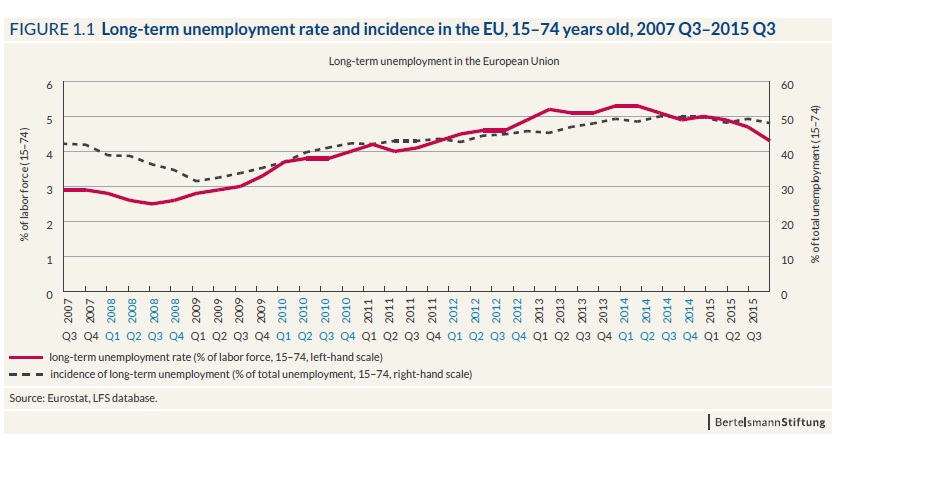Juan J. Dolado, Cecilia Garcia-Penalosa, Linas Tarasonis, (2016), “The Changing Nature of Gender Selection into Employment: Europe over the Great Recession”, CEPR DP 11367, Ιούνιος The aim of this paper is to evaluate the role played by selectivity issues induced by nonemployment in explaining gender wage gap patterns in the EU since the onset of the Great Recession. We show that male selection into the labour market, traditionally disregarded, has increased. …Read More
Quantitative Easing: The Challenge for Households Long-term Savings and Financial Security
Thimann, Christian, (2016), “Quantitative Easing: The Challenge for Households Long-term Savings and Financial Security”, CESifo Working Paper No. 5976, Ιούνιος The extremely low long-term interest rates in capital markets, to a relevant extent induced by quantitative easing, imply significant challenges for retirement saving and the stability of households’ purchasing power over the long-term. The reason is that prices for the two most important long-term savings objectives – housing and healthcare – are …Read More
Long-term Unemployment in the EU: Trends and Policies
Duell, Nicola, Thurau, Lena, Vetter. Tim, (2016), “Long-term Unemployment in the EU: Trends and Policies”, Bertelsmann Stiftung Study, 2016 As a consequence of the 2008 global economic and financial crisis, long-term unemployment has, yet again, become one of the key issues on the European labor market. In the third quarter of 2015, the European Union recorded some 22 million unemployed. Nearly half of these individuals (48.2 %) were unemployed for 12 months …Read More
The greatest reshuffle of individual incomes since the Industrial Revolution
Milanovic, Branko, (2016), “The greatest reshuffle of individual incomes since the Industrial Revolution”, Voxeu, 1 Ιουλίου The effects of of globalisation on income distributions in rich countries have been studied extensively. This column takes a different approach by looking at developments in global incomes from 1988 to 2008. Large real income gains have been made by people around the median of the global income distribution and by those in the global …Read More
The public economics of long term care
Pestieau, Pierre, Ponthiere, Gregory, (2016), “The public economics of long term care”, Centre for Economic Policy Reseach, Ιούνιος With the rapid increase in LTC needs, the negligible role of the market and the declining role of informal family care, one would hope that the government would take a more proactive role in the support of dependent elderly, particularly those who cannot, whatever the reason, count on assistance from their family. The …Read More
Germany : Financial Sector Assessment Program-Financial System Stability Assessment
International Monetary Fund, (2016), “Germany : Financial Sector Assessment Program-Financial System Stability Assessment”, IMF Publications, 29 Ιουνίου The country is home to two global systemically important financial institutions, Deutsche Bank AG and Allianz SE, as well as to one of the largest global central counterparties (CCP), Eurex Clearing AG. The system is also very heterogeneous, with a range of business models and a large number of smaller banks and insurers. …Read More
Government as Borrower of First Resort
Chemla, Gilles, Hennessy, Christopher, (2016), “Government as Borrower of First Resort”, Centre for Economic Policy Research, Ιούνιος We examine optimal provision of riskless government bonds under asymmetric information and safe asset scarcity. Paradoxically, corporations have incentives to issue junk debt precisely when intrinsic demand for safe debt is high since uninformed investors then migrate to risky overheated debt markets. Uninformed demand stimulates informed speculation which drives junk debt prices closer to fundamentals, encouraging …Read More
Growing Older: Germany Needs Reforms
Detragiache, Enrica, Natal, Jean-Marc, Pereira, Joana, (2016), “Growing Older: Germany Needs Reforms”, IMFdirect, 29 Ιουνίου Germany, a champion of structural reform prescriptions within the European Union, needs a large dose of the same medicine at home, too. Beyond public investment in transport and telecommunications, and more competition in services, dealing with an aging population needs urgent attention. With the right policies, Germany can bring more people into the workforce—and for longer—to …Read More
Bail-in versus bail-out: The Atlante example from a systemic risk perspective
Giudici, Paolo, Parisi, Laura, (2016), “Bail-in versus bail-out: The Atlante example from a systemic risk perspective”, VoxEU, 3ο Ιουνίου In April 2016, Italian banks set up an equity fund intended to recapitalise troubled financial institutions in a ‘private bail-out intervention’ scenario, with a view to avoiding a bail-in under the European Bank and Recovery Resolution directive. This column analyses the main differences between a bail-in and a bail-out scenario. In particular, …Read More
OECD Economic Surveys: Euro Area 2016
OECD, (2016), “OECD Economic Surveys: Euro Area 2016”, OECD Publishing, Ιούνιος Growth has picked up gradually over the past two years, supported by very accommodative monetary policy. The effect of fiscal policy on domestic demand has turned broadly neutral. But unemployment is still very high in many euro area countries, investment has been sluggish and credit remains weak. Inflation is well below target and market-based measures of inflation expectations have …Read More






